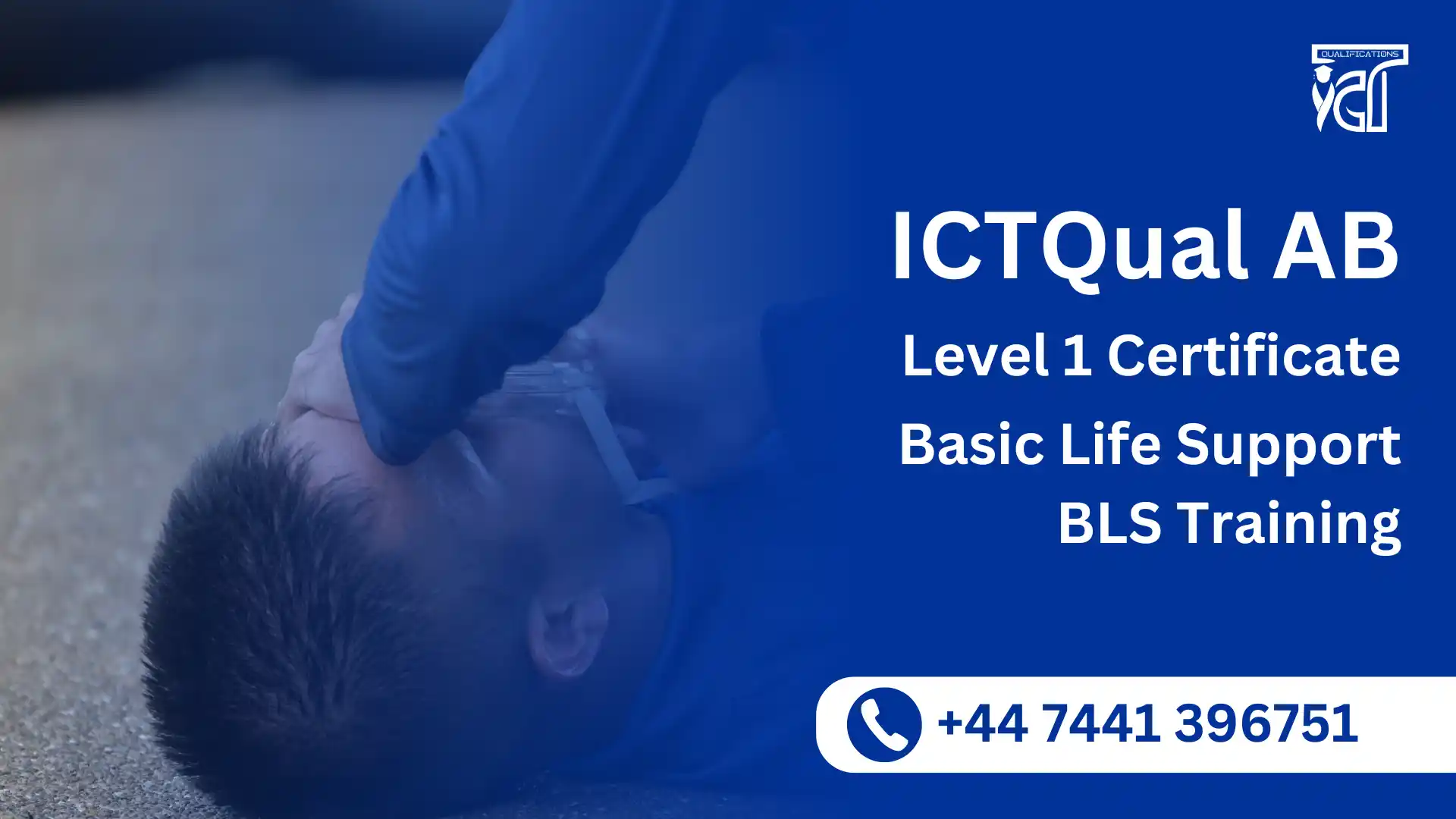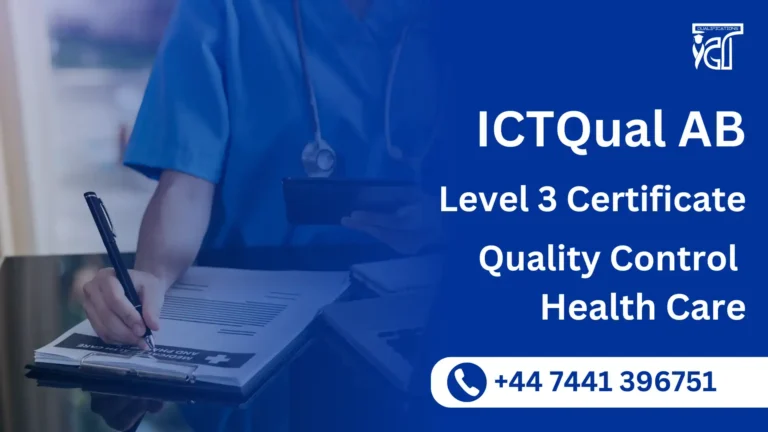The ICTQual AB Level 1 Certificate in Basic Life Support (BLS) Training is an introductory qualification designed to equip learners with fundamental life-saving knowledge and skills required to respond confidently and effectively in emergency situations. This course serves as a foundation in basic life support principles, enabling individuals to provide immediate assistance until professional medical help arrives.
Participants will be introduced to essential techniques such as recognizing signs of cardiac arrest, performing Cardiopulmonary Resuscitation (CPR), managing choking incidents, and ensuring personal and casualty safety during emergencies. The course emphasizes simple, practical skills that can be applied by anyone, regardless of prior experience or background.
Ideal for individuals with little or no previous first aid or medical training, this qualification is suitable for members of the general public, students, volunteers, and workplace staff who wish to gain the confidence to assist in common life-threatening scenarios.
Upon successful completion, learners will receive the ICTQual AB Level 1 Certificate in Basic Life Support, demonstrating their readiness to contribute to community safety and emergency preparedness in personal and professional environments.
ICTQual AB Level 1 Certificate in Basic Life Support BLS Training
The ICTQual AB Level 1 Certificate in Basic Life Support BLS Training qualification consists of 6 units and 12 Credits for the complete qualification.
- Basic Principles of Life Support
- Identifying Life-Threatening Situations
- CPR and AED Basics
- Choking, Drowning, and Suffocation Emergencies
- Responding to Common Workplace Medical Emergencies
- First Aid for Minor Injuries and Wounds
GLH (Guided Learning Hours) and TQT (Total Qualification Time) are terms commonly used in vocational qualifications to help define the amount of time a learner is expected to spend on their studies.
1. GLH (Guided Learning Hours)
GLH refers to the number of hours a learner spends being directly taught, supervised, or supported during their course. This includes the time spent in activities such as:
- Classroom instruction
- Practical workshops
- One-on-one tutoring or mentoring sessions
- Online learning sessions with tutor support
In other words, GLH represents the time that learners are actively engaged with their instructors or learning activities.
2. TQT (Total Qualification Time)
TQT represents the total amount of time a learner is expected to invest in completing a qualification, including:
- GLH (Guided Learning Hours): Time spent on direct learning, as explained above.
- Self-Directed Learning: This includes time spent on independent study, research, assignment completion, preparation for exams, and any other work the learner does outside of direct teaching hours.
TQT is a broader measure that includes all the time required to achieve the qualification. It helps learners and employers understand the overall commitment required for the qualification.
Key Differences Between GLH and TQT:
- GLH focuses on direct learning with guidance or supervision.
- TQT includes GLH as well as independent study time and other learning-related activities.
Example:
If a qualification has a TQT of 600 hours and a GLH of 250 hours, it means the learner should spend 250 hours in direct learning (classroom, online, or tutor-led sessions) and 350 hours on independent study or research.
Here are the learning outcomes for each study unit:
Basic Principles of Life Support
- Understand the fundamental concepts of basic life support and its role in emergency care.
- Recognise the importance of early intervention in life-threatening situations.
- Learn the chain of survival and how it improves patient outcomes.
- Develop an awareness of personal safety and infection control during life-saving procedures.
Identifying Life-Threatening Situations
- Recognise the signs and symptoms of cardiac arrest, stroke, and respiratory failure.
- Assess an individual’s level of consciousness and breathing status.
- Understand the importance of rapid response and emergency medical services (EMS) activation.
- Learn how to prioritise care in multiple casualty incidents.
CPR and AED Basics
- Demonstrate the correct technique for performing cardiopulmonary resuscitation (CPR) on adults, children, and infants.
- Understand the function and importance of an automated external defibrillator (AED) in cardiac emergencies.
- Learn how to operate an AED safely and follow voice prompts effectively.
- Recognise the correct compression-to-ventilation ratio for different age groups.
Choking, Drowning, and Suffocation Emergencies
- Identify the signs of choking in conscious and unconscious individuals.
- Learn the appropriate techniques for responding to choking in adults, children, and infants.
- Understand the risks associated with drowning and the correct approach to rescue and resuscitation.
- Develop an awareness of suffocation risks and preventive measures.
Responding to Common Workplace Medical Emergencies
- Identify common workplace medical emergencies, including heart attacks, seizures, and diabetic episodes.
- Understand how to provide initial care for individuals experiencing medical distress.
- Learn the role of workplace first aiders in coordinating emergency response.
- Recognise the importance of effective communication and reporting during emergencies.
First Aid for Minor Injuries and Wounds
- Learn how to manage minor cuts, burns, and abrasions safely and effectively.
- Understand the principles of wound cleaning, dressing, and infection prevention.
- Recognise signs of complications such as infections or allergic reactions.
- Develop confidence in providing basic first aid care in various settings.
Benefits of the ICTQual AB Level 1 Certificate in Basic Life Support BLS Training
Basic Life-Saving Knowledge
Learn the essential principles of Basic Life Support, including CPR, choking management, and safety awareness, to respond effectively during medical emergencies.
Confidence to Act in Emergencies
Develop the confidence to take immediate, appropriate action in life-threatening situations until professional medical help arrives.
Internationally Recognized Certification
Receive an internationally acknowledged Level 1 BLS Certificate, adding value to your personal skill set and enhancing your responsibility in public or workplace safety.
Accessible to All Learners
No prior medical knowledge or experience required—perfect for beginners, students, volunteers, or individuals wishing to gain basic first aid awareness.
Improves Workplace and Community Safety
Empowers learners to contribute to a safer environment at work, home, or public spaces by being prepared to assist in common emergencies.
Practical and Simple to Apply
Focuses on easy-to-learn, essential skills that can be quickly applied in real-life scenarios without the need for complex medical equipment.
Foundation for Further Training
Provides a stepping stone for more advanced life support and first aid qualifications, such as Level 2 or Level 3 BLS courses.
Ideal for Various Roles
Suitable for general public members, students, office staff, teachers, childcare workers, and anyone wishing to enhance their emergency response abilities.
Enhances Personal and Social Responsibility
Encourages a proactive attitude toward helping others in distress, promoting greater awareness of health and safety in everyday life.
Who is the ICTQual AB Level 1 Certificate in Basic Life Support BLS Training Best Suited For?
This course is ideal for:
General Public and Community Members
Individuals who want to learn basic life-saving skills to assist in emergencies at home, in public places, or within their communities.
Students and Young Adults
High school and college students seeking to develop fundamental first aid and BLS knowledge as part of their personal development or community service activities.
Teachers, School Staff, and Childcare Workers
Personnel responsible for the welfare of children and young people in educational and daycare settings who may need to respond to sudden medical emergencies.
Workplace Employees Across All Sectors
Office staff, retail workers, and other non-medical professionals who wish to be prepared for unexpected emergencies in the workplace.
Volunteers and Community Helpers
Individuals involved in volunteer activities, community events, or public gatherings where being equipped with basic life-saving skills could make a difference.
Family Caregivers
Parents, guardians, and caregivers who want to be prepared to assist family members, especially children, elderly, or vulnerable individuals, during emergencies.
Aspiring First Responders
Those who wish to build a foundational understanding of life support before progressing to more advanced first aid or emergency response qualifications.
Entry Requirements
Register Now
Qualification Process
Qualification Process for the ICTQual AB Level 1 Certificate in Basic Life Support BLS Training
- Self-Assessment:
Begin by evaluating your eligibility to ensure you meet the qualification requirements, including work experience, knowledge, and language proficiency. - Registration:
Complete your registration by submitting the required documents, including a scanned copy of a valid ID, and paying the registration fee. - Induction:
An assessor will conduct an induction to confirm your eligibility for the course and explain the evidence requirements. If you do not meet the criteria, your registration will be canceled, and the fee will be refunded. - Assignmnets & Evidence Submission:
Provide all assignmnets and the necessary evidence based on the assessment criteria outlined in the course. If you are unsure of the required evidence, consult with the assessor for guidance on the type and nature of evidence needed. - Feedback and Revision:
The assessor will review your submitted evidence and provide feedback. Evidence that meets the criteria will be marked as “Criteria Met,” while any gaps will be identified. You will be asked to revise and resubmit if needed. - Competence Evidence:
Submit final evidence demonstrating that all learning outcomes have been met. This evidence will be marked as “Criteria Met” by the assessor once it is satisfactory. - Internal Quality Assurance (IQA):
The Internal Quality Assurance Verifier (IQA) will review your evidence to ensure consistency, quality, and compliance with standards. - External Verification:
The IQA will submit your portfolio to ICTQUAL AB External Quality Assurance Verifiers (EQA) for final confirmation. The EQA may contact you directly to verify the authenticity of your evidence. - Certification:
Upon successful completion of all checks, ICTQUAL AB will issue your official certificate, confirming that you have attained the ICTQual AB Level 1 Certificate in Basic Life Support BLS Training.







